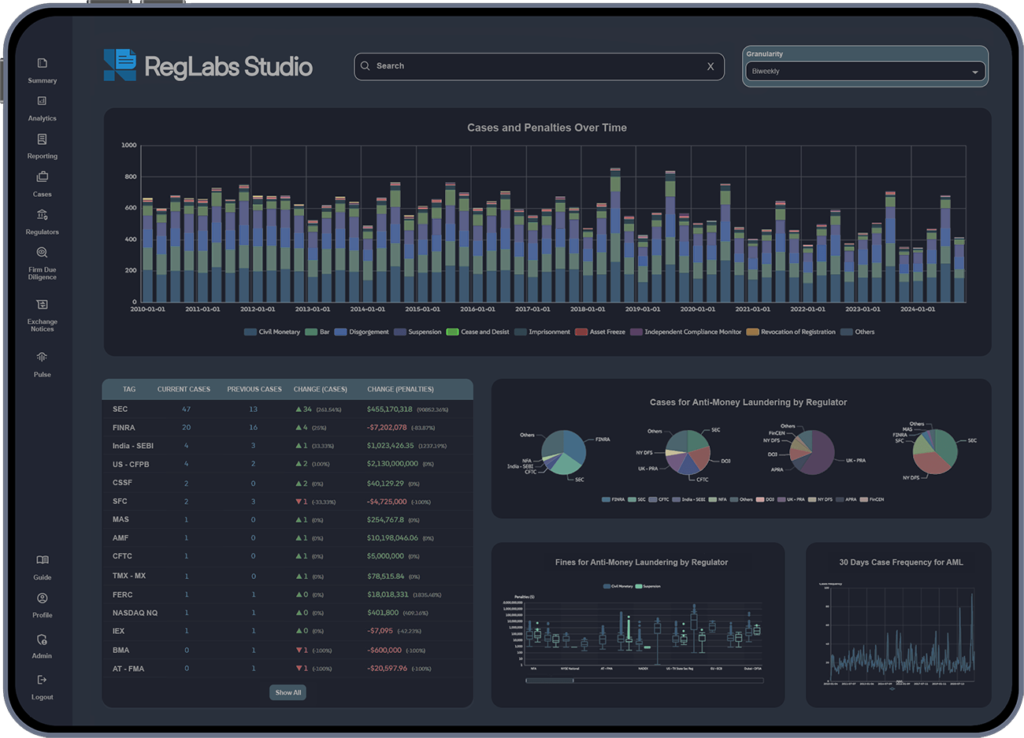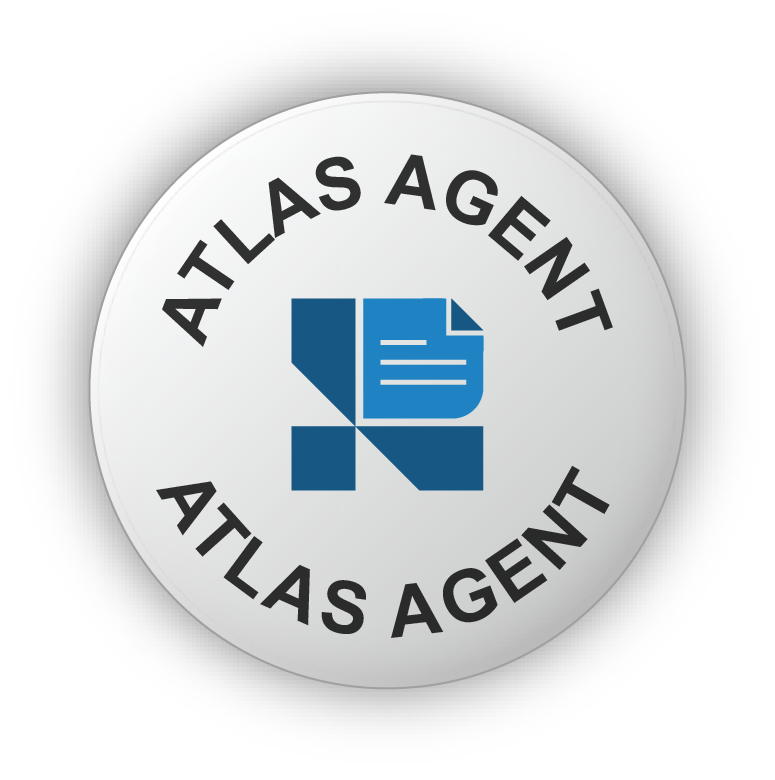Always Ahead. Always Compliant.
Stay ahead in a complex regulatory world and reduce compliance costs and unwanted risks.
Go from noise to signal with one powerful platform.
RegLabs Studio®
About Us
Constantly Chasing Compliance
Firms spend over 25% of their time and millions annually just to keep up with regulatory changes, which can exceed 800 updates per day. This burden is intensified by cross-border complexity, rising enforcement actions, and examinations that can exceed two years—all within a global regulatory environment fragmented between principles-based and enforcement-driven approaches.
Compliance Complexity Cracked
Regulatory compliance need not be complex. In today’s fragmented and shifting regulatory landscape, compliance is a data management challenge—not a legal checkbox exercise. RegLabs’ groundbreaking Agentic AI technology, ATLAS (Agentic Technology for Legal Alignment and Simplicity), redefines compliance as a data-centric solution. Embedded in RegLabs Studio®, our real-time compliance hub, ATLAS synthesizes activities from 150+ global regulators into actionable insights, systematically performing lessons-learned analyses, compliance risk assessments, and audit automation.
By continually learning from a vast and expanding dataset of 300,000+ US securities rules, 15,000+ regulator viewpoints, and 175,000+ enforcement cases, ATLAS cuts through regulatory noise in seconds. It mirrors how regulators think and enforce and serves as your compliance co-pilot. This allows you to redirect resources toward growth and speed-up the review and approval of business initiatives, while staying a step ahead of regulatory changes instead of merely surviving them.
Take command at every compliance touchpoint with RegLabs Studio®+ ATLAS and the world’s largest regulatory database, comprising:
150+
Global Regulators
Prudential and market regulators in over ten different industries.
350+
Regulatory Policies
Compliance rules, procedures, responsibilities and guidance.
215+
Regulatory Schemes
Market abuse, negligence and vulnerabilities resulting in fraud.
175K+
Regulatory Cases
Enforcement actions and penalties imposed by regulators.
Agentic Compliance Solutions
RegLabs’ ATLAS synthesizes global regulatory data into actionable insights through continuous learning and reasoning. Solutions include:

Horizon Scanning
Don’t Just Comply- Anticipate.
Stay ahead with comprehensive horizon scanning that continually monitors global regulations, enforcement cases, regulatory speeches, exchange notices, and more—all in one place.
Analyzing enforcement cases for our business used to take over 20 hours. RegLabs does this under 1.
-CCO global Investment Bank

Horizon Scanning
In today’s fast-evolving regulatory landscape, staying ahead of compliance risks is a constant challenge. ATLAS’ Horizon Scanning function delivers real-time global monitoring of regulatory developments and enforcement trends. It identifies emerging risks, tracks historical patterns, and offers tailored insights, enabling your business to proactively navigate regulatory changes. The analysis is customizable to your specific industry, policies, and compliance priorities, empowering your organization to make informed decisions, enhance compliance strategies, and allocate resources efficiently—turning regulatory intelligence into a competitive advantage.
Features
- Continuous Global Monitoring
- Tracks worldwide regulatory activity, including enforcement actions, proposed regulations, guidance, speeches, consultations, exchange notices and so much more.
- Provides real-time data from over 100 global regulators and more than 70,000 regulatory cases.
- Proactive Risk Identification
- Detects emerging compliance risks before they become enforcement priorities.
- Identifies historical regulatory trends, enforcement hotspots, and patterns to forecast future regulatory focus.
- Customizable Insights
- Tailors monitoring based on industry, business type, asset classes, roles, penalties, market abuse, prohibited schemes, and emerging issues.
- Provides specific, actionable intelligence relevant to your company’s unique compliance needs.
Benefits
- Early Risk Detection: Proactively adapt to regulatory trends instead of reacting after enforcement occurs.
- Informed Decision Making: Focus on areas most likely to be scrutinized by regulators, improving strategic planning.
- Enhance Compliance Strategy: Anticipate changes and implement preventative measures, reducing the likelihood of non-compliance.
- Efficient Resource Allocation: Reduce the time spent manually tracking regulations, allowing you to focus on core compliance activities.

Regulatory Examiner
Turn regulatory uncertainty into strategic advantage.
Our algorithms predict regulatory questions across 500+ compliance topics, speeding approvals, eliminating surprises and saving hundreds of hours during reviews.
It’s like having a crystal ball for compliance – much less stress and way fewer surprises.
-CCO mid-sized Asset Manager

Regulatory Examiner
Our Agentic AI technology, ATLAS, emulates how regulators examine firms and brings significant efficiency and foresight to the regulatory response process. By mirroring the structure, focus areas, and methodologies used in actual exams and inquiries, ATLAS helps firms anticipate what regulators are likely to review across hundreds of compliance and risk topics. This allows teams to proactively surface relevant evidence, validate controls, and organize documentation in alignment with regulatory expectations. As a result, firms can approach exams with clarity and confidence, avoiding surprises while accelerating their ability to respond with precision and completeness.
Additionally, expanding trading to a new market, launching a new product or asset class, or deploying a new trading strategy or algorithm can take 9+ months in most financial firms – often longer for complex or cross-border initiatives. A significant portion of this timeline is driven not by technology readiness or business planning, but by legal, compliance, and risk reviews, which are essential to ensure regulatory alignment, internal policy adherence, and sound risk governance. ATLAS surfaces the most likely regulatory questions and focus areas from the outset. Instead of starting from scratch or relying on generic checklists, teams receive a tailored, regulator-aligned perspective on what needs to be addressed—across 500+ compliance and risk topics. This enables legal, compliance, and risk functions to target their reviews, anticipate examiner concerns, and quickly identify where additional controls or disclosures may be needed. The result is faster alignment, reduced back-and-forth, and quicker go-to-market execution, all while maintaining regulatory readiness and risk rigor.
Features
- Mock Examination Simulator (500+ topics)
- Emulates full-scope and thematic regulatory exams by generating exam-style questions, document requests, and topic-level focus across a mapped taxonomy of 500+ compliance and risk areas.
- Global Regulatory Contextualization
- Interprets regulatory requirements and risk signals across jurisdictions, adapting mock exams and risk assessments to local, regional, and global standards. Helping ensure multinational firms maintain consistent compliance while accounting for jurisdiction-specific obligations, enforcement trends, and risk interpretations.
- Continuous Learning
- TConstantly absorbing regulatory changes and enforcement trends, ATLAS keeps compliance programs adaptive and forward-looking. No more static reviews or lengthy and expensive 1-off mock examinations. ATLAS helps firms anticipate new risks and regulatory demands, ensuring timely and targeted responses. This results in a robust, evolving compliance framework that supports sustained regulatory alignment.
Benefits
- Faster Go-To-Market: Accelerate your go-to-market strategy with ATLAS by anticipating regulatory questions before they arise. By uncovering key compliance and risk considerations early, ATLAS streamlines legal and compliance reviews for faster, smoother approvals. Launch with confidence – cutting delays while staying fully aligned with evolving regulatory expectations.
- Proactive Compliance Posture: Identifies vulnerabilities before regulators do, reducing regulatory, financial, and reputational risk by enabling preemptive correction of issues..
- Exam-Ready Documentation at Scale: Automatically prepares audit trails, findings logs, and policy evidence for each compliance topic, significantly cutting preparation time for mock exams and real regulatory inquiries while improving both response quality and speed.
- Resource Efficiency and Coverage Expansion: Augments limited compliance teams with 24/7 topic-level monitoring, enabling smaller teams to operate at a “regulator-grade” level of scrutiny without requiring proportional headcount increases.

Gap Analysis
Predict. Prevent. Protect.
Prevent violations before they occur by learning from industry-specific regulatory failures—systematically examining enforcement cases to proactively identify your compliance vulnerabilities.
Its gap analysis ability is a perfect example of how AI can enhance real-world compliance practices.
-CCO large Asset Manager

Gap Analysis
Regulatory missteps can be costly, but learning from past enforcement actions provides a powerful advantage. ATLAS’ Gap Analysis function enables you to identify and address compliance vulnerabilities by leveraging an extensive database of over 70,000 regulatory cases from more than 100 global regulators. It benchmarks compliance frameworks against historical enforcement trends, highlights regulatory pitfalls, and extracts actionable lessons from past violations. This proactive approach enables you to strengthen controls, mitigate risks, and refine compliance strategies—enhancing regulatory readiness, operational efficiency, and stakeholder confidence.
Features
- Compliance Gap Analysis
- Identify potential compliance gaps in relation to enforcement cases, regulatory schemes and policies.
- Highlight regulatory pitfalls that firms in similar industries or business models have encountered.
- Comparative Risk Assessment
- Benchmark your compliance framework against historical enforcement trends and regulatory expectations.
- Identify specific compliance vulnerabilities based on real-world enforcement actions, allowing you to pre-emptively address weak spots.
- Regulatory Lessons Extraction
- Identify insights into past regulatory violations, pinpointing common patterns of non-compliance.
- Translate enforcement data into actionable lessons, enabling you to proactively strengthen controls.
Benefits
- Proactive Risk Mitigation & Regulatory Readiness – Helps you avoid costly fines, reputational damage, and operational disruptions by learning from past enforcement actions while ensuring you stay ahead of regulatory scrutiny by proactively addressing potential compliance weaknesses.
- Smarter Compliance Strategy & Resilient Frameworks – Uses real-world enforcement cases to inform policy updates, enabling you to build stronger compliance programs that evolve in line with regulatory expectations and industry challenges.
- Operational Efficiency & Cost Reduction – Eliminates time-consuming manual research while lowering compliance-related costs by preventing errors before they occur.
- Enhanced Stakeholder Trust & Regulatory Confidence – Demonstrates your firm’s commitment to regulatory best practices by continuously refining compliance measures, building credibility with regulators, investors, and clients.

Risk Assessment
Automate risk assessment. Accelerate compliance confidence.
Automate comprehensive risk assessments across compliance, market abuse, cybersecurity, trading practices, and regulatory reporting using 15+ years of data from the world’s largest enforcement database.
We compare different regulator risks to deploy our resources most efficiently across our global offices.
-CCO Asset Manager

Automated Risk Assessments
Performing comprehensive risk assessments is an enormous undertaking, requiring significant time, effort, and coordination across multiple teams. For firms trading diverse products across numerous offices and regulatory jurisdictions worldwide, this complexity multiplies exponentially. Each jurisdiction comes with its own evolving regulatory demands, making it essential that risk assessments remain continuous and current – not stale snapshots. Yet, risk, compliance, and front-office teams often find themselves stuck in a relentless cycle: by the time one assessment is finalized, a new one must immediately begin, forcing them into a constant inefficient race to keep pace with emerging risks and regulatory expectations.
This “dog chasing its tail” scenario drains resources and limits firms’ ability to focus on strategic risk mitigation. Without automation and scale, staying ahead of years of evolving enforcement trends and regulatory priorities is virtually impossible – especially when risk must be evaluated across dozens of topics simultaneously.
Features
- World’s Largest ‘Golden Source’ Database
- Incorporates the world’s largest regulatory enforcement database spanning 25+ years, providing unmatched historical and thematic insights. Risk is analyzed directly from regulators as the ‘golden source’.
- Thematic Risk Categorization and Granularity
- Automatically organizes risks into focused categories such as cybersecurity, market abuse, conduct risk, and broader compliance themes for targeted analysis. Easily tailor across firm types, asset classes, and other dimensional variables that pragmatically represent business operations and risk profiles.
- Multi-Jurisdictional Coverage
- Supports automated assessments across 130+ regulators spanning every continent except Antarctica, adapting to local regulatory nuances.
- Continuous Risk Monitoring
- Enables real-time updates and re-assessments that reflect shifting enforcement priorities and emerging industry risks, keeping assessments perpetually current.
- Automated Risk Ranking and Prioritization
- Applies granular risk scoring algorithms that prioritize issues by universally-accepted risk characteristics like frequency and impact -enabling teams to focus on what matters most.
Benefits
- Significant Time Saving – Go from Months to Hours: Reduces risk assessment cycles from months to hours, freeing compliance teams to focus on proactive mitigation rather than data gathering.
- Consistency and Objectivity: Delivers standardized, repeatable assessments powered by automation – eliminating human bias and ensuring regulatory expectations are uniformly applied.
- Global Reach with Local Precision: Covers over 150 regulatory bodies worldwide, enabling firms to manage global risk with jurisdiction-specific accuracy.
- Dynamic and Continuous Insights: Keeps pace with changing regulations and enforcement trends by continuously updating risk profiles, avoiding stale or outdated assessments.
- Granular Risk Prioritization: Automatically ranks risks by detailed metrics like topic, geography, and business line—empowering firms to allocate resources efficiently and address the highest-impact vulnerabilities first.

Benchmarking
Raise the Bar – Lead the Industry.
Leverage the world’s largest regulatory database to evaluate your compliance program, comparing your performance against industry best practices through comprehensive enforcement activity analysis.
Automated compliance tracking frees our people to better support our business objectives.
-CCO large Broker-Dealer

Benchmarking
In an increasingly scrutinized regulatory environment, understanding how your compliance program stacks up against industry peers is essential. ATLAS’ Benchmarking function leverages the world’s largest regulatory database and advanced comparison tools to provide organizations with a clear, data-driven view of enforcement trends, competitor strategies, and industry best practices. By evaluating compliance performance against established standards and incorporating real-world case studies through its “lessons learned” program—aligned with Department of Justice best practices—this helps you refine your compliance frameworks, enhance training, and strengthen stakeholder trust. With benchmarking insights, you can proactively improve compliance strategies, reduce regulatory risk, and gain a competitive edge.
Features
- Access to the Largest Regulatory Database
- Aggregates data from global enforcement activities across various industries, clients, and competitors.
- Provides structured information that allows organizations to compare themselves against industry peers.
- Comparative Performance Metrics
- Evaluates your firm’s compliance program against best-in-class industry standards to pinpoint strengths and weaknesses.
- Highlights areas where competitors excel, allowing you to refine your compliance framework for competitive advantage.
- Lessons Learned Program
- Provides real-world case studies aligned with Department of Justice (DOJ) best practices to enhance compliance education.
- Strengthens internal compliance frameworks by incorporating insights from past enforcement actions.
Benefits
- Stronger Competitive Positioning – Benchmark against best-in-class compliance practices, reducing regulatory exposure.
- Data-Driven Compliance Planning – Gain insights into how competitors manage compliance, allowing for informed strategic adjustments.
- Improved Stakeholder Trust – Demonstrate adherence to high compliance standards building credibility with regulators, investors, and clients.
- Targeted Compliance Training – Lessons learned from enforcement cases helps you improve employee training and awareness of regulatory expectations.

Due Diligence
Swift Screening – Safer Investments.
Use advanced investigative tools to accurately assess a firm’s regulatory profile, enabling informed business decisions through comprehensive risk intelligence integrated across multiple risk exposures.
RegLabs uncovered critical regulatory risks in our due diligence that our usual screening missed.
-CCO large Hedge Fund

Due Diligence
Effective due diligence is essential for mitigating risk and ensuring informed decision-making in business relationships and investments. ATLAS’ Due Diligence function provides AI-powered investigative tools to assess a firm’s regulatory profile, disciplinary history, and compliance track record. By integrating regulatory intelligence into broader risk frameworks—including KYC, counterparty, credit, reputational, and operational risk assessments—this enables you to identify potential compliance liabilities before they escalate. With comprehensive due diligence capabilities, you can enhance investment confidence, strengthen risk mitigation strategies, and streamline compliance checks for greater operational efficiency.
Features
- Advanced Due Diligence Capabilities
- Use AI-powered investigative tools to assess a firm’s regulatory and disciplinary history.
- Get insights into the target firm’s past compliance performance before entering business relationships.
- Integrated Risk Intelligence
- Enhance KYC (Know Your Customer), counterparty risk, credit risk, operational risk, and reputational risk assessments.
- Get a detailed profile of the target firm’s regulatory track record, including enforcement actions, sanctions, and penalties.
Benefits
- Stronger Investment Confidence: Investors and businesses can make informed decisions, reducing exposure to high-risk partnerships.
- More Comprehensive Risk Mitigation: Proactively identify potential compliance liabilities before they become costly problems.
- Greater Operational Efficiency: Streamline compliance checks, reducing the time and effort required for due diligence investigations.

Change Management
Compliance Without Complications.
Simplify your regulatory change management with timely updates, impact assessments, and streamlined implementation tracking that help you efficiently adapt to evolving compliance requirements and standards.
Tracking regulatory changes used to be a nightmare. RegLabs made it seamless.
-CCO large RIA & BD

Change Management
Regulatory landscapes are constantly evolving, making it crucial for organizations to stay ahead of compliance changes. ATLAS’ Change Management function acts as a centralized regulatory intelligence hub, delivering timely updates on rule changes and their potential impact. With built-in impact assessment capabilities, it helps you evaluate regulatory shifts, plan proactive responses, and streamline compliance implementation across business units. Additionally, its archiving facilitates a historical record of changes and organizational responses, enabling you to track progress and demonstrate adherence over time. By simplifying change management, this enhances preparedness, fosters cross-team collaboration, and ensures regulatory compliance remains a strategic priority.
Features
- Regulatory Intelligence Hub
- Centralized platform for tracking updates to rules, laws, and compliance standards across jurisdictions.
- Ensures you stay informed about regulatory shifts that impact their business operations.
- Impact Assessment & Archive
- Enables an evaluation of the potential impact of regulatory changes on your business processes, providing more proactive and precise operational planning.
- Facilities the storage of historical regulatory changes for reference, ensuring your teams can track compliance evolution over time.
Benefits
- Improved Preparedness: Anticipate regulatory changes and implement necessary adjustments before new rules take effect.
- Streamlined Implementation: Simplify the process of incorporating compliance updates across business units.
- Enhanced Cross-Team Collaboration: Ensure all stakeholders—from legal teams to operations—are aligned on regulatory changes.
- Effective Progress Tracking: Archiving capabilities helps you track compliance evolution and demonstrate adherence to regulations over time.
RegLabs Studio®
Global compliance at your fingertips.
RegLabs Studio® is your intelligent hub for real-time compliance analytics. At its core is ATLAS, your regulatory co-pilot that transforms vast volumes of regulatory data into actionable insights within seconds. ATLAS mirrors regulatory thinking by continuously learning and reasoning from the world’s largest regulatory enforcement database comprising 300,000+ U.S. securities rules, 15,000+ regulator viewpoints, and 175,000+ global enforcement cases. Our technology is built on a doctrine we call the Compliance Triangle.
Rules Dimension
Rules form an important foundation for regulatory compliance, providing the explicit standards and regulations that organizations must follow. In general, there are two frameworks for rules: principles-based and prescriptive-based.
- Principles-Based Rules: Flexibility and Ambiguity
Principles-based regulation, used in jurisdictions like the UK, Hong Kong, and Australia, can provide flexibility and encourages innovation. However, its broad nature can lead to interpretation challenges and inconsistent application. Organizations may struggle to determine whether their compliance efforts align with regulatory expectations. - Prescriptive-Based Rules: Clarity and Rigidity
Prescriptive regulation, common in jurisdictions like the U.S., promotes clarity, consistency, and enforceability by defining specific compliance requirements. However, this approach can be rigid, costly, and subject to loopholes. Organisations may focus on meeting the letter of the law rather than achieving the intended regulatory outcomes, and overly detailed rules can become outdated as the financial services industry evolves. - Inconsistent Enforcement
Even when rules are clearly written, regulators may not enforce them consistently. This inconsistency can create confusion for businesses, as they may not know which rules are actively being enforced and which are not. This makes it difficult to prioritize compliance efforts effectively. - Voluminous and Complex Regulations
The sheer volume of rules and regulations can be overwhelming, particularly for organizations operating across multiple jurisdictions. The complexity of these rules, combined with their principles-based nature, can lead to inefficiencies and complications in compliance implementation.
While rules are essential, they are not enough on their own. Organizations must go beyond principles-based or prescriptive-based rules to understand how they are applied in practice. Particularly given the potential for ambiguity, rigidity, inconsistent enforcement, and the complexity of regulatory frameworks.
Cases Dimension
Cases refer to the enforcement actions taken by regulators, including penalties and sanctions. This dimension is the most critical for understanding regulatory compliance because it reveals what regulators are actually prioritizing in practice. Here’s why it matters:
- Revealing Regulatory Priorities
Enforcement actions provide a clear indication of what regulators are focusing on. By analyzing these cases, organizations can identify the areas where regulators are most likely to take action, allowing them to prioritize their compliance efforts accordingly. - Learning From Past Mistakes
Enforcement cases offer valuable lessons about common patterns of non-compliance. By studying these cases, organizations can identify weaknesses in their own compliance frameworks and take proactive steps to address them before they result in penalties or sanctions. - Following The Money
Enforcement actions often come with significant financial penalties, which can have a major impact on an organization’s bottom line. By tracking these penalties, organizations can understand the financial risks associated with non-compliance and take steps to mitigate them.
In summary, cases are the most important dimension of regulatory compliance because they reveal regulators’ actual priorities, provide lessons from past mistakes, and highlight the financial risks associated with non-compliance.
Guides Dimension
Guides refer to the communications and interpretations provided by regulators, which are crucial for understanding how rules are applied in practice. This dimension is critical for several reasons:
- Interpreting Rules
Principles-based regulation can lead to misinterpretation due to ambiguity, causing inconsistent compliance and retrospective enforcement. Prescriptive regulation, while clear, can result in technical misreadings, loophole exploitation, and rigid adherence that misses regulatory intent. Therefore, understanding how regulators interpret these rules is essential. Regulators often provide guidance through speeches, publications, and other communications, which offer insights into how they expect rules to be applied. Without this guidance, organizations may misinterpret principles-based and prescriptive rules, leading to compliance failures. - Anticipating Regulatory Expectations
Regulators’ communications often reveal their priorities and expectations, which may not be explicitly stated in the rules themselves. By analyzing these communications, organizations can better anticipate how regulators will interpret and enforce the rules, allowing them to align their compliance strategies with regulatory expectations. - Inconsistent Application of Rules
Regulators may not enforce rules consistently, and their guidance can provide clues as to which rules are likely to be enforced more strictly. Understanding this guidance helps organizations prioritize their compliance efforts and avoid areas where regulators are likely to focus their scrutiny.
In summary, guides are essential for interpreting principles-based rules, anticipating regulatory expectations, and understanding the inconsistent application of rules. Organizations must pay close attention to regulators’ communications to ensure they are aligning their compliance strategies with regulatory opinions.
The Compliance Triangle
Powered by Rules. Piloted by Guides. Proven by Cases.
Effective compliance goes beyond merely following written regulations. It requires a comprehensive, data-driven approach that encompasses:
- Rules (what’s written): Regulations form the foundation of compliance but are often voluminous and ambiguous. Relying solely on rules without considering regulatory guidance and enforcement trends can lead to inefficiencies and increased compliance risks.
- Guides (what’s said): Regulators’ speeches and publications offer crucial guidance that may differ from the literal wording of rules. Analyzing this guidance helps anticipate regulatory expectations and ensure compliance.
- Cases (what’s enforced): Analyzing past enforcement actions is paramount, as penalties and resource allocation reveal where regulators focus, providing insight into their true enforcement priorities.
Value of the Compliance Triangle
Introduction
Adopting a compliance strategy that incorporates Rules, Guides, and Cases provides a more effective and resilient framework for regulatory adherence. Rules offer the foundational legal framework, but without proper interpretation and enforcement insights, compliance efforts may be misdirected or incomplete. Guides help firms understand regulatory expectations and evolving priorities, while Cases reveal real-world enforcement trends, ensuring firms align with what regulators actively monitor and penalize. Combining these dimensions enhances proactive and accurate compliance, enabling your organization to dedicate more time and resources to business growth objectives.
Benefits
- 360° Compliance
Integrating Rules, Guides, and Cases creates a complete picture of what regulators expect. It covers both the clear-cut requirements and the subtle nuances, so decisions are made with full knowledge of the compliance landscape. This breadth of insight ensures a compliance program aligned with how rules are actually enforced in the real world. - Risk Mitigation
Focusing on a single dimension can create blind spots and gaps. Rules alone may not reflect evolving interpretations, guides may overlook enforcement trends, and cases without regulatory context can lead to reactive compliance. A three-dimensional approach greatly lowers the risk of violations and the costly fines or enforcement penalties that follow. - Operational Efficiency
By unifying rules, guidance, and case insights, compliance work becomes far more efficient. Teams eliminate duplicate work and focus their training on high-risk areas, which helps them respond faster to new requirements. The result is a nimble compliance culture that’s always one step ahead and quick to adapt, driving peak performance across your organization. - Strategic Advantage
A three-dimensional compliance strategy keeps you ahead of the curve as regulations evolve. You can swiftly adapt your compliance efforts to match shifting enforcement priorities, all while earning trust and credibility with regulators. This forward-looking strategy ensures resources are allocated optimally and gives your organization a competitive edge in an ever-evolving compliance environment.
RegLabs Case Studies
Horizon Scanning for Investment Bank

AI-driven automation delivered 60% cost reduction and eliminated regulatory update misses, saving 120hrs monthly.
Horizon Scanning for Global Investment Bank
Challenge
A global investment bank operating across North America, Europe, and Asia faced significant challenges tracking regulatory enforcement changes. Their compliance team manually monitored dozens of regulators, but the volume and frequency of updates made this process unmanageable. Important updates risked being missed, creating potential compliance gaps. Leadership feared overlooking critical regulatory changes that could result in fines or damage to their reputation, underscoring their need for a more effective monitoring solution.
Solution
ATLAS’s Horizon Scanning function delivered automated monitoring of regulatory changes across more than 100 global regulators. The system provided real-time alerts for relevant updates, eliminating manual tracking requirements. By distributing this information seamlessly to team members worldwide, the firm effectively initiated necessary remediation and enhancement projects.
Results
The firm achieved a 60% reduction in compliance monitoring costs and time, as the automated system freed about 120 hours per month, and reported 0 missed regulatory updates (down from 5+ annually).
Gap Analysis for Broker-Dealer

Compliance reviews were 80% faster with greater accuracy, finding missed information while freeing-up staff.
Gap Analysis for Broker-Dealer
Challenge
A Broker-Dealer specializing in trading and market-making wanted to understand the compliance risks pertaining to Regulation SHO: short selling requirements, order marking, aggregation units, and use of locates, believing that regulators would initiate a sweep on these topics in the upcoming year. The compliance team would historically seach for some cases online, sift through law firm emails over the years and compile their own documents and spreadsheets in an effort to centralize the information in one place. The team needed a systematic way to pinpoint gaps and vulnerabilities in competitor firms that could be applicable to its own firm, while having the justification behind why these risk areas were chosen for scrutiny.
Solution
The team used RegLabs’ regulatory database to identify any enforcement actions pertaining to Reg SHO and used the gap analytics features to compile risk areas for internal examination. RegLabs ATLAS’ analytics and reporting capabilities, sitting on top of the largest database for enforcement actions, pinpointed specific Reg SHO topics and enforcement trends.
Results
Compliance reviews were conducted ~80% faster and more accurately – having identified information previously missed by other service providers – freeing staff for higher-value activities.
Training for Major Global Bank

Training with practical case studies significantly improved business transparency and compliance escalations.
Improved Training for Global Bank
Challenge
A global bank needed to upgrade its training program as the organisation was growing substantially in its investment operations. Previously, it utilized a vendor training solution with some customization, but this solution largely focused on regurgitating rules and regulations. The organisation was particularly focused on training during employee onboarding, where it wanted to ensure that newcomers, especially in the trading and quantitative research divisions, were familiar with key issues involving risk management, technology governance, change management, web scraping, and other topics. The organisation also wanted the ability to highlight important industry developments as they occurred throughout the year and improve the engagement of its front office employees with its legal, compliance, and governance functions.
Solution
RegLabs ATLAS’ algorithmic dissection of enforcement actions gave the organisation ready-made case studies for training purposes that clearly explained applicable rules and regulations in a practical way. The content was naturally aligned to training.
Results
Front office personnel remarked that the case study practicalities made it the most relevant training they had received in their careers (of 15+ years experience) and that ‘this is how all compliance training needs to be conducted.’ Legal & Compliance personnel remarked that the updated approaches to training improved the transparency and escalation of questions by the business to compliance.
Due Diligence on Investment Manager

Due diligence time and effort cut by 50%, accelerating the investment allocation decision-making.
Operational Due Diligence on Investment Manager
Challenge
In determining whether to award an investment allocation to an Investment Manager, an Allocator wanted to ensure the Investment Manager had proper controls, governance, and compliance best practices in place. The Allocator had traditionally used standard due diligence questionnaires and review processes, but this allocation was larger than previous investments and the Investment Manager employed more emerging technology (e.g., alternative data, AI) in its investment processes which carried new regulatory risks. The Allocator wanted to sharpen its due diligence approach on these areas and compare peer funds, to ensure the prospective Investment Manager was exercising the highest duty of care.
Solution
RegLabs ATLAS function delivered a comprehensive compliance risk profile. It reviewed enforcement records, flagging past fines, ongoing investigations, and possible control gaps. This gave the Allocator the specific areas of scrutiny it needed to deep-dive as part of its operational due diligence prior to making any investment decisions.
Results
The Due Diligence module neatly organized targeted risk areas in minutes, including alternative data, web scraping, algorithmic trading governance and risk controls, hedge and liability clauses, and valuation methodologies on illiquid assets. The analysis significantly reduced the compliance due diligence time and effort by 50%, accelerating the investment allocation decision-making.
Business Expansion for Hedge Fund Manager

Outside counsel spend reduced by 85% and compliance assessment completed in one week.
New Business Expansion: Compliance Risk Assessment & Resource Allocation for Hedge Fund Manager
Challenge
A hedge fund manager wanted to expand its trading strategies to India and Dubai. The firm hadn’t previously traded in these markets and wanted to know what regulatory requirements and compliance risks it needed to account for in its expansion. The firm already operated a compliance program and wanted to understand which areas it could scale as well as whether any new developments were needed to ensure compliance in the new regions. The firm’s APAC operations were operated out of the US and UK primarily, as it was resource-conscious, so it wanted to ensure it was prudently applying a risk-based approach toward the expansion efforts while enabling a go-to-market as quickly as possible.
Solution
RegLabs’ database enabled the hedge fund manager to easily identify enforcement actions by SEBI in India and DFSA in Dubai applicable to its business type (investment adviser, hedge fund). The regulator comparison analytics simplified identifying which topics both regulators prioritized, assessed monetary risks across these topics compared to existing regulatory regimes (SEC, FCA), tracked evolving regulatory risks, and guided necessary adjustments to the compliance program to meet SEBI’s and DFSA’s requirements.
Results
RegLabs’ analytics minimized outside counsel spend by 85% and enabled the compliance risk assessment as well as the resource allocation review to be completed within a week.
For
- Chief Compliance Officers & Compliance Personnel
- Chief Risk Officers & Enterprise Risk Personnel
- Business Controls & Front Office Supervisory
- General Counsels & Legal Personnel
- Surveillance Personnel
- Internal Audit
RegLabs Latest News
-
Regulatory Roulette
Financial institutions navigate an increasingly unpredictable regulatory environment where rules constantly change. This creates compliance challenges, complicates planning, increases costs, and threatens reputations. Organizations that fail to adapt risk regulatory penalties, limiting growth opportunities and viability in an already complex industry.








